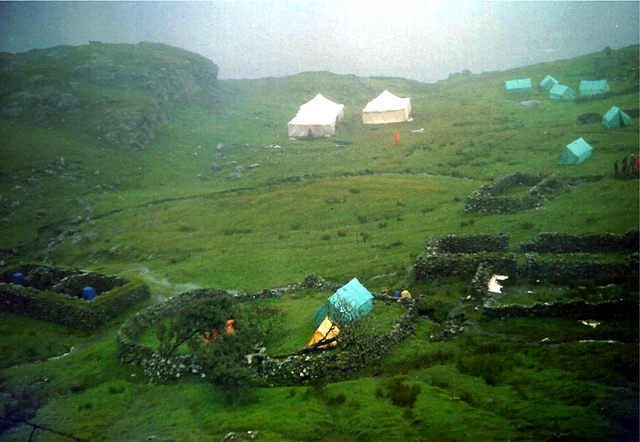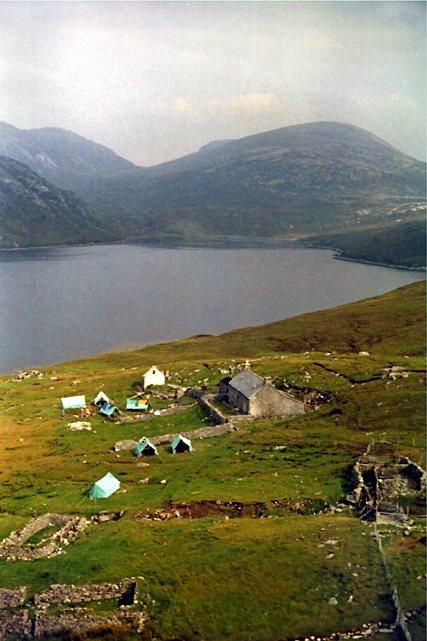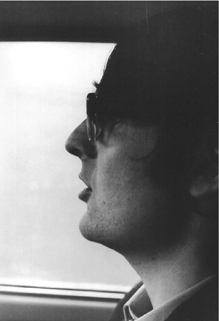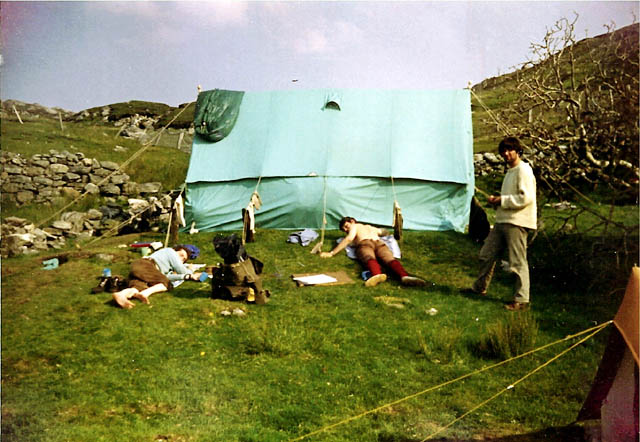![]()
![]()
Lewis 1972
Leader: Gavin Macpherson
Officers: John Cullingford, Alan Evison, Ken Hunter, Peter Smith, Peter Tatham and David Vale
Boys: Mark Baker, David Barney, Rupert Bates, Alan Beaney, Derek Brown, Tony Carnwath, Adam Courlander, Rodney Fawcett, Dickie
Friend, Julian Garrish, Paul Gowland, Dick Green, Mark Hall, Nick Hanson, Richard Hellier, Tim Jeans, Peter Jeffries, Neil Jones,
Howard Lucas, Stephen Middleton, Robert Morrison, Colin Moss, Chris Parsons, John Parrott, Richard Ritter, Ray Snook,
Jeremy Stock, Jeremy Turff, Julian Upton, Barry Watson, Richard Williams.
LEADER'S REPORT
|
It is surprising how quickly one manages to reorientate oneself about one's surroundings. In two weeks, Aird Bheag which, when we arrived, had seemed like the very end of the world, had become quite like home, a centre for the surrounding country that had become our world. I don't suppose that many of us will forget our arrival for a long time to come. One goes to the Hebrides in the full knowledge that the weather is not exactly reliable, but on that day it turned on us with all its fury. A Force 8 gale blew in from the Atlantic, driving the incessant rain hard against the island. We were all soaked by the time the 'GOLDEN CHANCE' was loaded at Amhuinnsuidhe, cold as well when we boarded the launch at Husinish, and getting tired and, in some cases, seasick, when at last we reached Aird Bheag. Then followed the toil of carrying every item of food and equipment up the steep 400-yard path to the campsite, a path which for much of its length was 6" under a torrent of water. But we made it, and by ten o'clock that night the tents were up and we were fed. One thing was certain: conditions could only improve. And now it is all over I'm sure the expedition was all the better for its hard beginning. Conditions did improve, but only slowly. For a week the mist hardly rose off the loch, and we had to content ourselves with damp sorties into nearby hills, or braving the seas of Loch Tamanavay in the 'MAY’ or the canoes |
|
|
But then the sun came out, and Lewis was there in all its splendour. Beauty for me could well be defined as standing on the rock over the camp watching the sun set behind the dark hills, the red sky reflected from the stillness of the loch. In the end, after the weather had done its worst, we achieved a lot. In particular, we found what may well turn out to be a megalithic stone circle on the point not half a mile from the campsite. We made a comprehensive survey of the bird life in one particular 1O km grid square to tie in with a national survey. We collected plastic bottles from the seashore with writing in German and Russian and surprisingly little English. Aird Bheag was surveyed, using theodolite and tape, with tent poles for survey stations. We spread our net far and wide, and most people bivvied out at some time or another. Parties visited the Standing Stones at Callanish, and built sand-castles on Uig Sands. The climbers went across the loch in search of new climbs, and spent a night there, whilst the ornithologists were away twice to see the birds in the early morning. It was after one of these bivvies that we were able to put our emergency procedures to the test. The party was overdue, when smoke was seen on the far-side of the loch, and whistles were heard. The 'MAY’ was dispatched, and made a record crossing, and brought back one member of the party and all their equipment. Fortunately, there was nothing seriously wrong, but it proved we could rescue someone from two miles away in under an hour. It was a great nuisance not to have an outboard for the 'MAY', desperate efforts having failed to find a replacement for the damaged one we should have had. Nevertheless, there seemed to be no lack of keen oarsmen, and she spent much of her time on the loch. Our other water transport — the canoes — were universally acclaimed as a great success and were in use on almost every possible occasion. |
 |
| A friendly spirit of competition existed between officers and boys! The officers, of course, always won, but sometimes we had to disqualify the boys in order to do it! The officers, however, are prepared to concede victory in the rowing race provided that our tactical triumph in the tug-of-war is acknowledged. Football provided the most closely fought contest, particularly in view of the natural hazards of the pitch — like the stream across the middle of it. After several postponements, the orienteering was eventually run between four teams. We even managed to find a cup to present to the winners. The evenings provided what was, I believe, a most successful innovation. Each night one person was allowed to choose a subject, and asked to read or say a few words about that subject. And afterwards, discussion was allowed to develop. Sometimes, such discussion went on for an hour or so, and sometimes it broke quickly into a good round of singing. And then suddenly we ran out of time. On the last night there was Fifi Pops and Birthday Cake and Cabaret. We had intended to start clearing up on the last night but we were too busy, so we did it all, plagued by midges, in the morning and were almost ready to go when the 'GOLDEN CHANCE' came in at half-past nine. The journey back was the exact opposite of the journey out. The sea was calm, the sun shone, the air was so clear that we could see St.Kilda jutting out of the Atlantic nearly fifty miles away. If the expedition had started on an all-time low, then it ended on an all-time high. | |
|
I will remember so many things about Lewis
that it is hard to pick out just a few to mention. The tug-of-war team sitting
in mystified confusion after the officers let go of the rope must come high on
the list (unkind, though it is). There was the view across Loch Resort, and the
one stag that came on us unawares and stood, confused, not thirty yards away.
There were the evening talks, and the guitar and the singing. There was
Hebridopoly, a gallant attempt to counter the spread of the Bridge disease.
There was mackerel and floats and, of course there was custard. There was the
day it got so wet that we had to bale out the marquee with buckets, and the day
it was so dry we had to walk right away from the camp to get our water. There
was Donald and Danny from the head of the loch. There was the Service on Sunday
with almost 1OO per cent, voluntary attendance when we sang 'Lord of the Dance1
and 'Were You there?' There are many people we must thank. First of all, of
course, there is Andrew Miller Mundy, who allowed us to use Aird Bheag and who
transported us there and back. Once again, we must be grateful to George and
Sheila Newhall for the use of the Scout Hut in Stornoway, and for all their help
and hospitality. Thank you, too, to all the S.H.S. organisers, to Roger and John
and Alistair and Phil and Richard and all the others who put in so much time and
work so that we could enjoy ourselves. But most of all I would like to thank the
31 Boys and 6 Officers of the expedition. The work you put in, the spirit with
which you tackled a difficult and exhausting experience, and the enthusiasm you
showed throughout really made my job very easy indeed. I hope you enjoyed it all
as much as I did. GAVIN MCPHERSON |
|

The Aird Bheag campsite once the sun had come out - about a week after arrival!
Right -Drying out! |
 |
 |
|
|